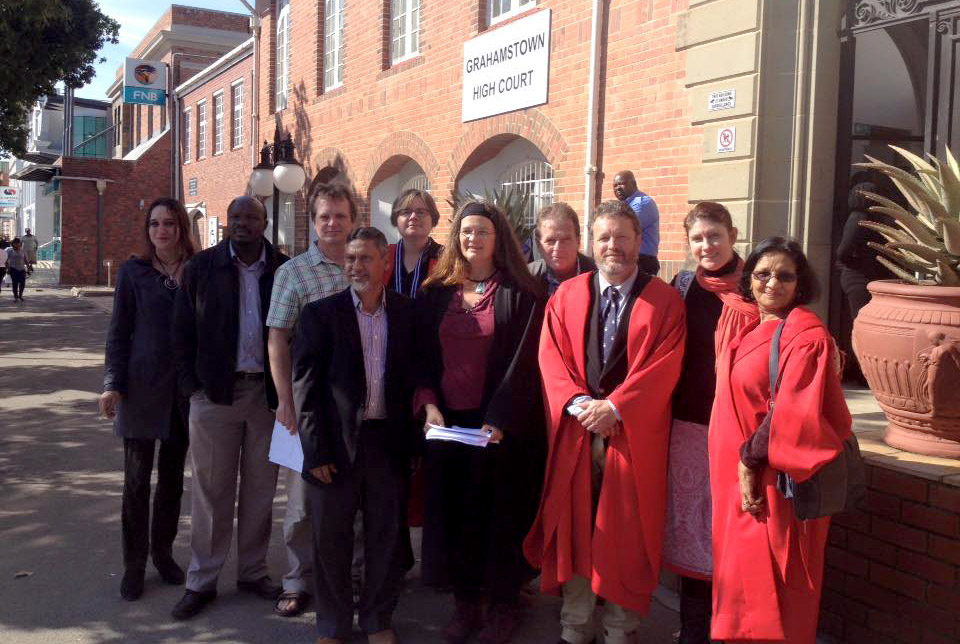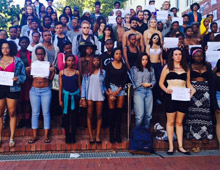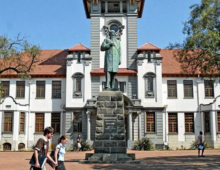[intro]Last month, protesting students shut down the University Currently Known As Rhodes (UCKAR) to draw attention to rape culture and the proliferation of sexual violence on their campus. While students called for action against alleged sexual offenders using the hashtag #RUReferenceList, police used stun grenades and teargas on those protesting, a number of students were arrested and a court interdict was issued. The interdict was brought against protestors, three students named in the #RUInterdict, the Student Representative Council, and Dr Corinne Knowles, a staff member in the Extended Studies Unit. Chelsea Haith reports from Grahamstown.[/intro]
An interim interdict was taken out by university management at UCKAR against protesting students during the #RUReferenceList protests in April. The interdict bans protestors from engaging in unlawful activities including vandalism, intimidation and assault.
The #RUReferenceList is a list containing the names of 11 men, both current and former Rhodes University students alleged to have been involved in sexual assault. The list was anonymously released on social media on Sunday 17 April.
Opposing the interdict, the Concerned Staff
The interim interdict was reviewed on 17 May at the Grahamstown High Court where the Concerned Staff gathered to lodge a notice to oppose the interdict. The Concerned Staff consists of 38 staff members who have released a statement condemning the multiple forms of violence that are currently characterising the tensions between protestors and management.
The Concerned Staff must present an affidavit to oppose the interim interdict by 6 June. The court date to review the interim interdict is 1 September. This means that instead of making the interim interdict permanent it has simply been extended to this date, subject to review by the court on the mentioned court date. As a result of the interdict, tensions between the management, staff and students have been higher than ever.
The Concerned Staff have sent three letters to management, voicing their unease with the university’s reactions to the protests. All of their letters have gone unanswered. In the letter sent on 13 May they wrote, “A ‘law and order’ suppression of the symptoms of the crisis is not helping. We want universities to be much more responsive to the genuine underlying issues – issues that in the current environment can only be raised by protest.”
Dr Corinne Knowles is a member of the Concerned Staff and was recently served a lawyers letter, supposedly from university management, demanding she cease and desist from protest activity, following a social media conversation she allegedly had with student protestors about safe and legal ways to disrupt. On Freedom Day, students gathered outside the library at UCKAR to stand in solidarity with Knowles, using the hashtag #Disrupt.

Knowles shared the widely held view by the Concerned Staff that the interdict is a tactic to “scare students, escalate tensions and dehumanise relations on campus.”
The Concerned Staff have also highlighted the necessity of using the academic space as an opportunity for real social transformation:
“For the university to be a real instrument of change and to transcend its colonial and apartheid legacy it has to look deeply into itself and that means that we all need to accept that we could be wrong in the way we work, the way we think and in our personal interactions.”
Sexual Violence Task Team
Following the end of the protests with the imposition of the interim interdict, a group of staff and students have formed the Sexual Violence Task Team, currently being steered by Prof Catriona Macloed, the Chair of the Critical Studies in Sexualities and Reproduction research programme. The task team comprises of staff and student volunteers, and is made up of several sub task teams and includes members of the #RUReferenceList task team as well as protest leaders.
The formation of the task team was one of the demands made by the protestors who asked that a group be formed to look at and change the way that the university deals with rape cases and rape culture. The sub task teams are: Safe Spaces for Survivors/Victims, Policies and Procedures, Curriculum and Activities, Systemic Issues, Local and National Issues, Academic Project and Protocal, Monitoring and Evaluation.
‘Universities must be at the forefront’
Speaking to the issue of legal and illegal protest, a document titled ‘Principles Guiding our Academic Community’ has been circulated at the university which, though still in the draft stages, aims to hold management, staff and students to mutual accountability on issues of protest and addressing transformation concerns.
“We want universities to initiate dialogue about how to resolve issues rather than to be reactive. We also want universities to be at the forefront of the challenge to the policies (most notably, but not only, austerity policies) that are creating the situation. Universities must not be mere functionaries in the system. They must disrupt it,” said a recent statement released by the Concerned Staff.
While the demand that a task team be formed to address how the university deals with rape cases and rape culture is being met, one protest leader, Yolanda Dyantyi, feels that the university is using the task team to avoid meeting the more pressing demand that those on the #RUReferenceList be suspended.
Alleged Arson
In what may or may not be a related incident, a small fire was started in the Main Administration Building of UCKAR on the morning of 12 May, but was quickly discovered and contained, causing little to no damage. One of the students on the #RUReferenceList committee, who spoke on condition of anonymity, opined that the alleged arson would give the university management more ammunition to make the interdict permanent, which is exactly the opposite of what students are trying to achieve.
New #disrupt documentary keeps the conversation going
The student news organisation Activate launched a feature-length documentary directed by Michael Dorfling titled Disrupt, depicting the rape culture protests that took place at UCKAR from 17 April onwards. The documentary will be screened at the National Arts Festival held in Grahamstown in July, followed by a panel discussion with the producers.
While the documentary has been met with some sexist and racist responses, the Executive Producer Mitchell Shaun Parker said, “It holds up a mirror to those people and asks the question: ‘How are you complicit in this culture that has so painfully wounded the collective consciousness of women across the country?”
Director and editor, Dorfling hopes that the documentary will help to clarify the reasons for the protests and to keep the conversations about rape culture going so that the issues are addressed not only in policy but also in people’s mindsets. “People have been ignoring and silencing this issue for way too long. We also wanted to make sure people see what actually happened during the protests,” he said.
Regardless of what happens next, at the UCKAR, rape culture is on everyone’s minds, challenging management and students alike to consider their positions and complicity in a patriarchal system that denies the integrity of womxn’s bodies.
Images courtesy of Kate Janse Van Rensburg and Deborah Seddon.











Hi there, just became aware of your blog through Google, and found that it is really informative.
I am going to watch out for brussels. I will be grateful if you continue this in future.
Numerous people will be benefited from your writing.
Cheers!
Hi everybody, here every person is sharing such
experience, so it’s pleasant to read this blog, and I used to pay a quick visit this website daily.
le migliori pillole per l’erezione https://sildenafilit.bid/ pillole per erezione in farmacia senza ricetta
If some one wishes to be updated with most recent technologies afterward he must be pay
a visit this site and be up to date everyday.
CBD exceeded my expectations in every way thanks. I’ve struggled with insomnia in the interest years, and after tiring CBD like https://www.cornbreadhemp.com/blogs/learn/hemp-vs-marijuana because of the prime time, I for ever practised a busty night of restful sleep. It was like a bias had been lifted off the mark my shoulders. The calming effects were gentle yet intellectual, allowing me to drift afar naturally without sensibilities woozy the next morning. I also noticed a reduction in my daytime apprehension, which was an unexpected but allowed bonus. The partiality was a bit shameless, but nothing intolerable. Overall, CBD has been a game-changer inasmuch as my nap and anxiety issues, and I’m grateful to have discovered its benefits.
I just could not go away your website before suggesting that I really enjoyed the usual info a person supply on your guests?
Is going to be back often to inspect new posts